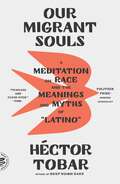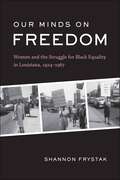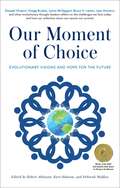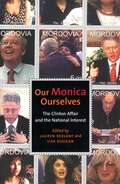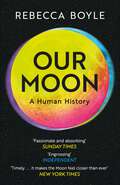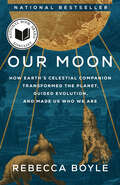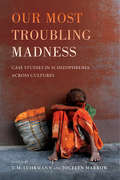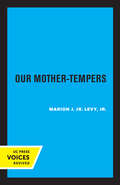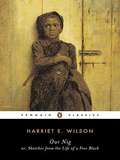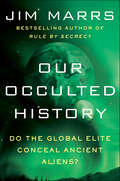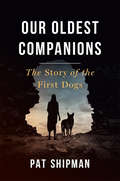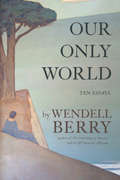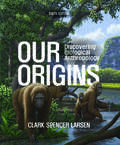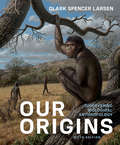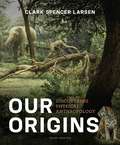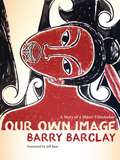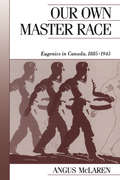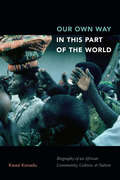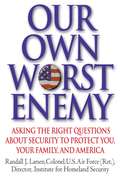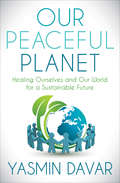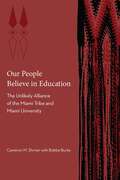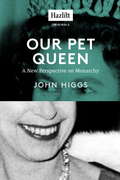- Table View
- List View
Our Migrant Souls: A Meditation on Race and the Meanings and Myths of “Latino”
by Héctor TobarWINNER OF THE KIRKUS PRIZE FOR NONFICTIONNamed One of The New York Times’ 100 Notable Books of 2023One of Time’s 100 Must-Read Books of 2023 | A Top Ten Book of 2023 at Chicago Public LibraryA new book by the Pulitzer Prize–winning writer about the twenty-first-century Latino experience and identity.In Our Migrant Souls, the Pulitzer Prize–winning writer Héctor Tobar delivers a definitive and personal exploration of what it means to be Latino in the United States right now.“Latino” is the most open-ended and loosely defined of the major race categories in the United States, and also one of the most rapidly growing. Composed as a direct address to the young people who identify or have been classified as “Latino,” Our Migrant Souls is the first account of the historical and social forces that define Latino identity.Taking on the impacts of colonialism, public policy, immigration, media, and pop culture, Our Migrant Souls decodes the meaning of “Latino” as a racial and ethnic identity in the modern United States, and gives voice to the anger and the hopes of young Latino people who have seen Latinidad transformed into hateful tropes and who have faced insult and division—a story as old as this country itself.Tobar translates his experience as not only a journalist and novelist but also a mentor, a leader, and an educator. He interweaves his own story, and that of his parents’ migration to the United States from Guatemala, into his account of his journey across the country to uncover something expansive, inspiring, true, and alive about the meaning of “Latino” in the twenty-first century.A new book by the Pulitzer Prize–winning writer about the twenty-first-century Latino experience and identity.In Our Migrant Souls, the Pulitzer Prize–winning writer Héctor Tobar delivers a definitive and personal exploration of what it means to be Latino in the United States right now. “Latino” is the most open-ended and loosely defined of the major race categories in the United States, and also one of the most rapidly growing. Composed as a direct address to the young people who identify or have been classified as “Latino,” Our Migrant Souls is the first account of the historical and social forces that define Latino identity.Taking on the impacts of colonialism, public policy, immigration, media, and pop culture, Our Migrant Souls decodes the meaning of “Latino” as a racial and ethnic identity in the modern United States, and gives voice to the anger and the hopes of young Latino people who have seen Latinidad transformed into hateful tropes and who have faced insult and division—a story as old as this country itself. Tobar translates his experience as not only a journalist and novelist but also a mentor, a leader, and an educator. He interweaves his own story, and that of his parents’ migration to the United States from Guatemala, into his account of his journey across the country to uncover something expansive, inspiring, true, and alive about the meaning of “Latino” in the twenty-first century.
Our Minds on Freedom: Women and the Struggle for Black Equality in Louisiana, 1924-1967 (Library of Southern Civilization)
by Shannon FrystakTraditionally, literature on the civil rights movement has highlighted the leadership of ministerial men and young black revolutionaries like the Reverend Martin Luther King, Jr., Stokely Carmichael, and Malcolm X. Though recent studies have begun to explore female participation in the struggle for racial justice, women have generally been relegated to the margins of civil rights history. In Our Minds on Freedom, Shannon Frystak explores the organizational and leadership roles female civil rights activists in Louisiana assumed from the 1920s to the 1960s, highlighting a diverse group of courageous women who fought alongside their brothers and fathers, uncles and cousins, to achieve a more racially just Louisiana.From the Depression through World War II and the postwar years, Frystak shows, black women joined and led local unions and civil rights organizations, agitating for voting rights and equal treatment in the public arena, in employment, and in admission to Louisiana's institutions of higher learning. At the same time, black women and white women began to find common ground in organizations such as the YWCA, the NAACP, and the National Urban League. Frystak explores how women of both races worked together to organize the 1953 Baton Rouge bus boycott, which served as inspiration for the more famous Montgomery bus boycott two years later;in the day-to-day struggle to alter the system of unequal education throughout the state; and in the fight to integrate New Orleans schools after the 1954 Brown decision.In the early 1960s, a new generation of female activists joined their older female counterparts to work with organizations such as the NAACP, the Congress of Racial Equality (CORE), and a number of local grassroots civil rights organizations. Frystak vividly describes the very real dangers they faced canvassing for voter registration in Louisiana's rural areas, teaching in Freedom Schools, and hosting out-of-town civil rights workers in their homes.As Frystak shows, the civil rights movement allowed women to step out of their socially prescribed roles as wives, mothers, and daughters and become significant actors, indeed leaders, in a social movement structure largely dominated by men. Our Minds on Freedom is a welcome addition to the literature of the civil rights movement and will intrigue those interested in African American history, women's history, Louisiana, or the U.S. South.
Our Moment of Choice: Evolutionary Visions and Hope for the Future
by Robert Atkinson Kurt Johnson Deborah MoldowWINNER OF THE 2020 GOLD NAUTILUS BOOK AWARD * 2021 SILVER COVR VISIONARY AWARD * 2021 NEW YORK BOOK FESTIVAL AWARD * 2021 GOLD LIVING NOW AWARD This timely and compelling anthology is a rousing call-to-action for all of us to help transform the world into a just, peaceful, and thriving one—featuring creative and practical solutions to the many crises facing humanity today.Humanity is currently facing a series of interconnected emergencies that threaten our very survival—from climate change to economic inequality and beyond. And yet, at the same time, a global shift towards harnessing our collective power to create a life-affirming future is flourishing. Featuring chapters by forty-three leading-edge contributors, such as Gregg Braden, Lynne McTaggart, Bruce Lipton, Jean Houston, Michael Bernard Beckwith, Ervin Laszlo, Joan Borysenko, Larry Dossey, and many more, Our Moment of Choice provides eye-opening and inspirational visions for a unified, peaceful, and thriving world. The time has come for all humanity to be united in purpose. This is our collective moment of choice, upon which our future depends.
Our Monica, Ourselves: The Clinton Affair and the National Interest (Sexual Cultures #37)
by Lisa Duggan Lauren BerlantAlongside the O.J. Simpson trial, the affair between Bill Clinton and Monica Lewinsky now stands as the seminal cultural event of the 90s. Alternatively transfixed and repelled by this sexual scandal, confusion still reigns over its meanings and implications. How are we to make sense of a tale that is often wild and bizarre, yet replete with serious political and cultural implications? Our Monica, Ourselves provides a forum for thinking through the cultural, political, and public policy issues raised by the investigation, publicity, and Congressional impeachment proceedings surrounding the affair. It pulls this spectacle out of the framework provided by the conventions of the corporate news media, with its particular notions of what constitutes a newsworthy event. Drawing from a broad range of scholars, Our Monica, Ourselves considers Monica Lewinsky's Jewishness, Linda Tripp's face, the President's penis, the role of shame in public discourse, and what it's like to have sex as the president, as well as specific legal and historical issues at stake in the impeachment of Bill Clinton. Thoughtful but accessible, immediate yet far reaching, Our Monica, Ourselves will change the way we think about the Clinton affair, while helping us reimagine culture and politics writ large. Contributors include: Lauren Berlant, Eric O. Clarke, Ann Cvetkovich, Simone Weil Davis, Lisa Duggan, Jane Gallop, Marjorie Garber, Janet R. Jakobsen, James R. Kincaid, Laura Kipnis, Tomasz Kitlinski, Pawel Leszkowicz, Joe Lockard, Catharine Lumby, Toby Miller, Dana D. Nelson, Anna Marie Smith, Ellen Willis, and Eli Zaretsky.
Our Moon has Blood Clots: The Exodus Of The Kashmiri Pandits
by Rahul PanditaRahul Pandita was fourteen years old in 1990 when he was forced to leave his home in Srinagar along with his family, who were Kashmiri Pandits: the Hindu minority within a Muslim majority Kashmir that was becoming increasingly agitated with the cries of ‘Azadi’ from India. The heartbreaking story of Kashmir has so far been told through the prism of the brutality of the Indian state, and the pro-independence demands of separatists. But there is another part of the story that has remained unrecorded and buried. Our Moon Has Blood Clots is the unspoken chapter in the story of Kashmir, in which it was purged of the Kashmiri Pandit community in a violent ethnic cleansing backed by Islamist militants. Hundreds of people were tortured and killed, and about 3,50,000 Kashmiri Pandits were forced to leave their homes and spend the rest of their lives in exile in their own country. Rahul Pandita has written a deeply personal, powerful and unforgettable story of history, home and loss.
Our Moon: A Human History
by Rebecca BoyleLonglisted for the National Book Award 2024'Passionate and absorbing'SUNDAY TIMES'I learned more about the Moon by reading this book than after a lifetime of study'CHRIS HADFIELD, author of An Astronaut's Guide to Life on Earth'Superb: as much a feat of imagination as it is a work of globe-trotting scholarship'TELEGRAPH'Boyle's writing shines, shifting through time and space, science and sentiment; a luminous read'REBECCA WRAGG SYKES, author of Kindred'You will never look at the Moon the same way again . . . fascinating'NEW STATESMAN'A riveting feat of science writing'ED YONG, author of An Immense World'Engrossing'INDEPENDENTEvery living being throughout history, across time and geography, has gazed up at the same moon.From the first prehistoric life that crawled onto land guided by the power of the tides, to the division of time into months and seasons for the first humans, the moon has driven the expansion and development of our world.It has inspired scientific discovery and culture from the ancient astronomers to the scientific revolution of Copernicus and Galileo, from the 1969 Apollo landings to writers and artists, and stirred an inexhaustible desire to know where we come from and how we got here.And as astronauts around the world prepare to return to the Moon - opening up new frontiers of discovery, profit and politics - Our Moon tells the dazzling story of how the Moon has shaped life as we know it, fuelled dramatic change across the globe and could be the key to humanity's future.
Our Moon: How Earth's Celestial Companion Transformed the Planet, Guided Evolution, and Made Us Who We Are
by Rebecca BoyleNATIONAL BESTSELLER • &“A riveting feat of science writing that recasts that most familiar of celestial objects into something eerily extraordinary, pivotal to our history, and awesome in the original sense of the word.&”—Ed Yong, New York Times bestselling author of An Immense WorldA New York Times Book Review Editors&’ ChoiceMany of us know that the Moon pulls on our oceans, driving the tides, but did you know that it smells like gunpowder? Or that it was essential to the development of science and religion? Acclaimed journalist Rebecca Boyle takes readers on a dazzling tour to reveal the intimate role that our 4.51-billion-year-old companion has played in our biological and cultural evolution. Our Moon&’s gravity stabilized Earth&’s orbit—and its climate. It drew nutrients to the surface of the primordial ocean, where they fostered the evolution of complex life. The Moon continues to influence animal migration and reproduction, plants&’ movements, and, possibly, the flow of the very blood in our veins. While the Sun helped prehistoric hunters and gatherers mark daily time, early civilizations used the phases of the Moon to count months and years, allowing them to plan farther ahead. Mesopotamian priests recorded the Moon&’s position in order to make predictions, and, in the process, created the earliest known empirical, scientific observations. In Our Moon, Boyle introduces us to ancient astronomers and major figures of the scientific revolution, including Johannes Kepler and his influential lunar science fiction.Our relationship to the Moon changed when Apollo astronauts landed on it in 1969, and it&’s about to change again. As governments and billionaires aim to turn a profit from its resources, Rebecca Boyle shows us that the Moon belongs to everybody, and nobody at all.
Our Most Troubling Madness: Case Studies in Schizophrenia across Cultures (Ethnographic Studies in Subjectivity #11)
by Prof. T.M. LuhrmannSchizophrenia has long puzzled researchers in the fields of psychiatric medicine and anthropology. Why is it that the rates of developing schizophrenia--long the poster child for the biomedical model of psychiatric illness--are low in some countries and higher in others? And why do migrants to Western countries find that they are at higher risk for this disease after they arrive? T. M. Luhrmann and Jocelyn Marrow argue that the root causes of schizophrenia are not only biological, but also sociocultural. This book gives an intimate, personal account of those living with serious psychotic disorder in the United States, India, Africa, and Southeast Asia. It introduces the notion that social defeat--the physical or symbolic defeat of one person by another--is a core mechanism in the increased risk for psychotic illness. Furthermore, "care-as-usual" treatment as it occurs in the United States actually increases the likelihood of social defeat, while "care-as-usual" treatment in a country like India diminishes it.
Our Mother-Tempers
by Marion J. Levy Jr.This book boldly states and deeply analyzes a commonplace observation about us all: our mothers play a powerful role in making us the kind of people we are. By the age of three, four, or five, virtually all children have learned to walk, talk, eat, sleep, control bodily functions, interact with other people, be male, or be female—insofar as these things are learned—from their mothers (or a mother surrogate who is female). Every mother has known and knows this. Most social analysts, according to the author, both know it and ignore it. If our mothers are asymmetrically influential in shaping our initial years, and our fathers usually in the background, what does it reveal about the social sources of human sex roles, including the universal precedence of males over females in all known societies? These are fundamental, normative, and often deeply emotional matters. Professor Levy seeks to consider them in a scientific spirit, clear the path for better understandings of the role of mothers, and inspire new research on early socialization. This title is part of UC Press's Voices Revived program, which commemorates University of California Press’s mission to seek out and cultivate the brightest minds and give them voice, reach, and impact. Drawing on a backlist dating to 1893, Voices Revived makes high-quality, peer-reviewed scholarship accessible once again using print-on-demand technology. This title was originally published in 1989.
Our Nation 5th Grade
by Richard G. Boehm James A. Banks Kevin P. Colleary Walter C. Parker Gloria Contreras Mary A. Mcfarland A. Lin GoodwinIn this textbook you will meet special people and learn many important things. On the BIOGRAPHY pages and in the POINTS OF VIEW lessons, you will see eight important words that help define what it means to be a good citizen. These words are COURAGE, FREEDOM, HONESTY, JUSTICE, LEADERSHIP, LOYALTY, RESPECT and RESPONSIBILITY. They help us understand how to be better citizens in our home, neighborhood, school, community, country, and world.
Our Nig
by Wilson Harriet E.Books for All Kinds of Readers. ReadHowYouWant offers the widest selection of on-demand, accessible format editions on the market today. Our 7 different sizes of EasyRead™ are optimized by increasing the font size and spacing between the words and the letters. We partner with leading publishers around the globe. Our goal is to have accessible editions simultaneously released with publishers' new books so that all readers can have access to the books they want to read. to find more books in your format visit www. readhowyouwant. com
Our Occulted History: Do the Global Elite Conceal Ancient Aliens?
by Jim MarrsBestselling author Jim Marrs steps once again to the cutting-edge of research into conspiracies and hidden truths. In Our Occulted History, Marrs goes beyond the revelations of his classic Alien Agenda and illustrates how human civilization may have originated with non-humans who visited earth eons ago...and may still be here todayOur Occulted History: Do the Global Elite Conceal Ancient Aliens? is an extensive survey that includes a mass of well-documented scientific and historical texts and sources. It will change the way you view the origins of mankind and the current state of society.No subject is too controversial for Marrs, an award-winning journalist whose other investigative works include Crossfire: The Plot That Killed Kennedy, the basis for the Oliver Stone film JFK; Rule by Secrecy; and The Trillion-Dollar Conspiracy.
Our Oldest Companions: The Story of the First Dogs
by Pat ShipmanHow did the dog become man’s best friend? A celebrated anthropologist unearths the mysterious origins of the unique partnership that rewrote the history of both species. Dogs and humans have been inseparable for more than 40,000 years. The relationship has proved to be a pivotal development in our evolutionary history. The same is also true for our canine friends; our connection with them has had much to do with their essential nature and survival. How and why did humans and dogs find their futures together, and how have these close companions (literally) shaped each other? Award-winning anthropologist Pat Shipman finds answers in prehistory and the present day. In Our Oldest Companions, Shipman untangles the genetic and archaeological evidence of the first dogs. She follows the trail of the wolf-dog, neither prehistoric wolf nor modern dog, whose bones offer tantalizing clues about the earliest stages of domestication. She considers the enigma of the dingo, not quite domesticated yet not entirely wild, who has lived intimately with humans for thousands of years while actively resisting control or training. Shipman tells how scientists are shedding new light on the origins of the unique relationship between our two species, revealing how deep bonds formed between humans and canines as our guardians, playmates, shepherds, and hunters. Along the journey together, dogs have changed physically, behaviorally, and emotionally, as humans too have been transformed. Dogs’ labor dramatically expanded the range of human capability, altering our diets and habitats and contributing to our very survival. Shipman proves that we cannot understand our own history as a species without recognizing the central role that dogs have played in it.
Our Only World: Ten Essays
by Wendell BerryAs the United States prepares to leave its long war in Afghanistan, it now must contemplate the necessity of sending troops back to Iraq, recalling General Colin Powell's advice to President Bush: "If you break it, you own it," asthe world's hot spots threaten to spread over the globe with the ferocity of a war of holy terror and desperation.The planet's environmental problems respect no national boundaries. From soil erosion and population displacement to climate change and failed energy policies, American governing classes are paid by corporations to pretend that debate is the only democratic necessity and that solutions are capable of withstanding endless delay. Late Capitalism goes about its business of finishing off the planet. And we citizens are left with a shell of what was once proudly described as The American Dream.In this new collection of eleven essays, Berry confronts head-on the necessity of clear thinking and direct action. Never one to ignore the present challenge, he understands that only clearly stated questions support the understanding their answers require. For more than fifty years we've had no better spokesman and no more eloquent advocate for the planet, for our families, and for the future of our children and ourselves.
Our Origins
by Clark Spencer LarsenThe latest discoveries in biological anthropology, made relevant for all students. <P><P> Our Origins provides an accessible and engaging introduction to biological anthropology, with an emphasis on the discipline’s relevance and latest research advancements. Through balanced and clear explanations, author Clark Larsen ensures that students not only grasp the basics but also understand how what they’re learning applies to their own lives, communities, and prospective career paths. The book’s clear and concise writing, rich art program, and focus on new discoveries empower every student to succeed in the course.
Our Origins (Fifth Edition)
by Clark Spencer LarsenThe best introduction to what’s fascinating and relevant about anthropology today Our Origins does more than any other text to educate students about the value of anthropological study and the ways they can apply it in their everyday lives. Norton, more than any other publisher, promotes student engagement with anthropology. Norton continues to innovate with our unique “Anthropology at Work” and “Anthropology Matters” text features that ensure students connect with the course material and understand the underlying science and why it matters. This pedagogy complements Larsen’s emphasis on introducing students to the most exciting and important discoveries and research happening in the field today. This purchase offers access to the digital ebook only.
Our Origins: Discovering Physical Anthropology (Third Edition)
by Clark Spencer LarsenThe Third Edition now includes an update to the evolutionary primate taxonomy and even more tools to help students grasp the major concepts in physical anthropology--including new, photorealistic art.
Our Own Image: A Story of a Maori Filmmaker
by Barry BarclayAcclaimed Maori filmmaker Barry Barclay&’s Our Own Image relates the experiences of making his documentaries and his critically acclaimed feature-length film Ngati (1987), widely credited as the first fiction feature by a member of an indigenous community. Barclay details his views on the process of filmmaking within his own Maori community and discusses how his work differed from popular cinema, advocating for indigenous control, participation, and perspectives in media.Our Own Image gives an in-depth depiction of the changes Barclay&’s approach contributed to the field of documentaries, as well as displaying the respect for community Barclay brought to his filming technique. His insistence on letting people speak for themselves demonstrated authenticity to audiences, creating awareness of indigenous cinema in New Zealand and worldwide.
Our Own Master Race
by Angus MclarenWas Canada immune to the racist currents of thought that swept central Europe in the 1920's and 1930's? In this landmark book Angus McLaren, co-author of The Bedroom and the State, examines the pervasiveness in Canada of the eugenic notion of "race betterment" and demonstrates that many Canadians believed that radical measures were justified to protect the community from the "degenerate." The sterilization of the feeble-minded in Alberta and British Columbia was merely the most dramatic attempt to limit the numbers of the "unfit." But in the decades prior to World War Two, eugenic preoccupations were to colour discussions of immigration restriction, birth control, mental testing, family allowances, and a host of similar social policies. Doctors, psychiatrists, geneticists, social workers, and mental hygienists provided an anxious Canadian middle class with the reassuring argument that poverty, crime, prostitution, and mental retardation were primarily the products of defective genes, not a defective social system. In explaining why biological solutions were sought for social problems McLaren not only provides a provocative reappraisal of the ideas and activities of a generation of feminists, political progressives, and public health propagandists but he also explores some of the roots of our not-so-latent racist tendencies.
Our Own Way in This Part of the World: Biography of an African Community, Culture, and Nation
by Kwasi KonaduKofi Dᴐnkᴐ was a blacksmith and farmer, as well as an important healer, intellectual, spiritual leader, settler of disputes, and custodian of shared values for his Ghanaian community. In Our Own Way in This Part of the World Kwasi Konadu centers Dᴐnkᴐ's life story and experiences in a communography of Dᴐnkᴐ's community and nation from the late nineteenth century through the end of the twentieth, which were shaped by historical forces from colonial Ghana's cocoa boom to decolonization and political and religious parochialism. Although Dᴐnkᴐ touched the lives of thousands of citizens and patients, neither he nor they appear in national or international archives covering the region. Yet his memory persists in his intellectual and healing legacy, and the story of his community offers a non-national, decolonized example of social organization structured around spiritual forces that serves as a powerful reminder of the importance for scholars to take their cues from the lived experiences and ideas of the people they study.
Our Own Worst Enemy: Asking the Right Questions About Security to Protect You, Your Family, and America
by Randall LarsenOUR OWN WORST ENEMY provides a solid, practical, logical approach to personal security for all Americans and explains why the government is not prepared to help us in a time of crisis (Katrina, 9/11, etc.). Leading homeland security expert Randall J. Larsen details what we must do as citizens to protect ourselves, our families and our assets. The key, Larsen argues, is finally asking the right questions about homeland security, such as:-"How do we prevent a terrorist organization from becoming a nuclear power?" The media frequently poses the question: "What can we do to ensure that al Qaeda does not smuggle a nuclear weapon into the U.S. through one of our ports?" But the right question should focus on prevention -- and the answer is far different from the discussion that dominates the debate and the spending priorities of the Bush Administration and Congress.
Our Park (Places in Our Community)
by Lisa J. AmstutzParks are important places in our community. It takes many community helpers to keep a park clean and beautiful. Readers will learn about who works at a park, what the workers do, and what makes a city park special. Simple, at-level text and vibrant photos help readers learn all about community parks.
Our Peaceful Planet: Healing Ourselves and Our World for a Sustainable Future
by Yasmin DavarTransform yourself and transform the world. The steps you can take to positively shape your reality and then pay it forward . . . Our Peaceful Planet contains extraordinary ideas that have the power to transform lives and the planet. It is unique because it provides a practical healing framework for the whole world, starting at how people can change the beliefs that cause them to be destructive in their own lives and in their own world, to the actions that they can take to create global peace and environmental and economic sustainability. Our Peaceful Planet shows how when each part of one person&’s world—beliefs, governance, environment, industries, economy—dynamically interacts, it affects the entire planet. It contains big ideas for world leaders and little ideas for everyday people, because everyone has the power to make a difference, to themselves and others, and to the world. Our Peaceful Planet is a blueprint for the future in which everyone can play a role.
Our People Believe in Education: The Unlikely Alliance of the Miami Tribe and Miami University (Indigenous Education)
by Cameron M. Shriver Bobbe BurkeAcross the United States, many institutions are striving to acknowledge and repair oppressive pasts and unequal presents, even as Indigenous communities are struggling to reclaim and revitalize the philosophies and knowledges of their elders. Our People Believe in Education explores the stories of the Miami Tribe of Oklahoma and Miami University to show how two organizations with almost nothing in common, aside from the name Miami, have collaborated to support Indigenous language and cultural revitalization. Founded in 1809, Miami University is a midsize public university in Oxford, Ohio, on land that once belonged to the Miami Tribe. The Miami Tribe of Oklahoma was, like many tribal nations, forcibly removed from its homelands and is now headquartered in northeast Oklahoma. Cameron M. Shriver and Bobbe Burke provide a reflective examination of why a relationship developed between the two entities despite significant geographical and ideological hurdles, and how that partnership has evolved since 1972, when Myaamia chief Forest Olds first visited Miami&’s university campus in his nation&’s homeland. This intimate history of a tribe and a university struggling to reconcile colonial education with Indigenous survival offers a jumping-off point for new conversations in, and between, these two spheres.
Our Pet Queen
by John HiggsIn the modern, democratic twenty-first century, the notion of an unelected, dynastic monarchy is not easy to defend.This new book argues that the current monarchy is by far the best system for choosing a Head of State - providing that it is understood that we are not subjects and that the monarchy are not our superiors. They are, in actual fact, our pets. In this original eBook, John Higgs, author of the The 20th Century: An Alternative History, makes an argument in favour of the monarchy that will annoy royalists even more than it will annoy republicans. This is a tongue-in-cheek, witty examination of the persistence of monarchy in the modern world.
